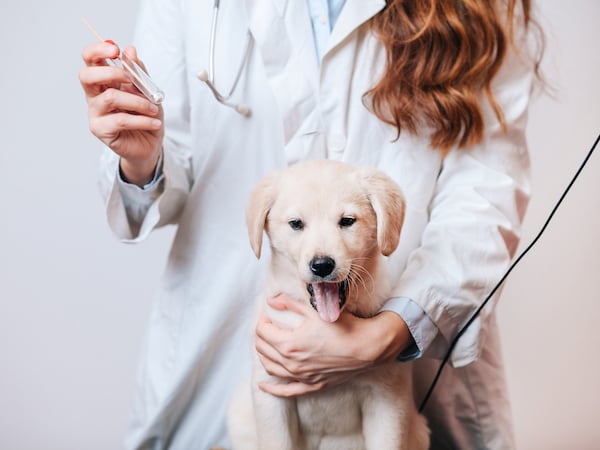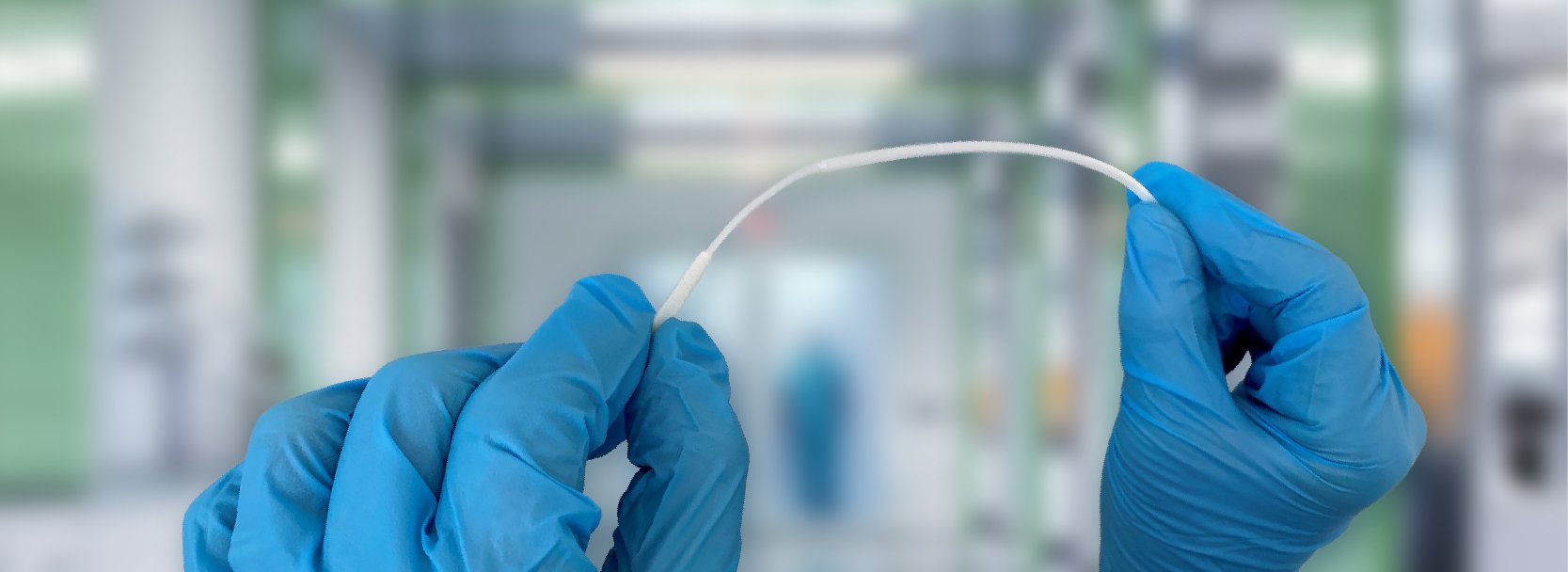
Our pets, whether furry or feathered or something else, are family members. There are many of us who pay closer attention to our pet's health than we do to our own. And, many of us agree that annual wellness checks for our pets are essential. When illness or injury of a pet needs attention at any time, we don’t wait – we turn to our trusted veterinarian.
In this guide, we will discuss companion animal care needs, explore who uses animal specimen swabs and applicators, discuss the types available, and highlight what to look for in a trusted manufacturer.
Without further ado, let’s dive in (as always, first with the basics).
What is companion animal care?
For those who are less familiar with this term, let’s first root ourselves in what this blog is all about.
Companion animal care refers to the comprehensive care and attention given to pets such as dogs, cats, rabbits, birds, and other domesticated animals that live in the comfort of their owner’s home. Companion animal care encompasses various aspects of their well-being, including nutrition, exercise, grooming, vaccinations, preventive healthcare, and medical treatment, when needed.
During a companion animal veterinary visit, you can expect a routine physical exam of a happy, healthy pet, which often includes a good look at eyes, ears, skin and mouth. This will likely be followed by a thorough hands-on check of all body parts to confirm normal conformation or to find abnormalities. Assessment of gait and the way the animal moves and carries itself can help spot a neurological problem, or a problem with the spine. Then, a blood draw to check for internal or metabolic problems, and of course, check for parasites, including heartworms.
What Diagnostic & Specimen Collection is Done in Companion Animal Care?
One integral part of companion animal care is diagnosing and treating illnesses, which often requires the collection of biological specimens for laboratory analysis.
Common needs that involve diagnostic and specimen collection include:
-
Health Monitoring: Regular tests help monitor a pet's overall health and detect any underlying issues before they become serious. Early detection often leads to more effective treatment and better outcomes.
-
Disease Diagnosis: Tests can help diagnose various diseases and medical conditions in pets. This includes common ailments like respiratory infections, dental problems, skin diseases, urinary tract infections, and more.
-
Treatment Planning: Accurate diagnosis through testing enables veterinarians to develop targeted treatment plans. Different conditions require specific treatments, and testing helps determine the most appropriate course of action.
-
Preventive Care: Tests are a crucial part of preventive healthcare. For example, blood tests can identify potential health risks and allow for early intervention to prevent diseases.
-
Infectious Disease Control: Many tests are used to screen for infectious diseases, such as rabies, heartworm, and feline leukemia. Identifying these diseases early is essential for managing and preventing their spread.
-
Monitoring Chronic Conditions: For pets with chronic conditions (e.g., diabetes or kidney disease), regular testing is necessary to assess the effectiveness of treatment and adjust medications as needed.
-
Surgical Preparations: Some tests are required before surgeries to ensure the pet is healthy enough for anesthesia and the procedure. These tests reduce the risks associated with surgery.
-
Reproductive Health: Testing is essential for breeding animals to confirm pregnancy and assess reproductive health. It can also help identify fertility issues.
-
Allergy Diagnosis: Allergy testing can pinpoint specific allergens that may be causing skin or respiratory issues in pets. This allows for targeted treatment and allergen avoidance strategies.
-
Behavioral Assessments: In some cases, medical tests may be used to rule out medical issues that could be contributing to behavioral problems in pets (e.g., frequent indoor urination).
-
Research and Epidemiology: Specimen collection tests in pets can be essential for research purposes, studying disease patterns, and understanding zoonotic diseases (diseases that can be transmitted between animals and humans).
-
Genetic / DNA Testing: For owners curious about what breed mix their animals have or if they’re prone to any long-term conditions based on their genetic makeup, DNA or genetic testing is a common option to explore.
Overall, diagnostic and specimen collection tests in pets are performed to ensure their well-being, diagnose and treat medical conditions, prevent the spread of diseases, and enhance our understanding of their species. Regular testing and veterinary care are essential components of responsible pet ownership, helping to ensure that our companion animals lead healthy and happy lives.
Who Uses Animal Specimen Swabs & Applicators for Companion Animal Care?
When an injury, infection or illness is the problem, your vet will rely not only on x-ray or scan but also on some basic tools. These tools could be the familiar tongue depressor (e.g., splinting) or cotton swab or applicator for cleaning or for applying a topical medication. A synthetic tipped swab may be used to collect a specimen from inside an ear or a wound. These are all very familiar items, but there is more to them than you might think.
Though essentially very basic tools, swabs and applicators for medical use range in size and are available made of a number of materials. Here is an overview of what you’ll find from Puritan in this category:
Types of Animal Specimen Swabs and Applicators for Companion Care
There are several types of swabs and applicators designed specifically for companion animal care. Puritan's veterinary swabs and applicators are designed with precision and care to ensure accurate and safe specimen collection. Their products are made from high-quality materials, undergo rigorous quality control processes, and are backed by a reputation for excellence in the medical industry.
Common single-use items like swabs or applicators and tongue depressors complement the more sophisticated methods your vet will employ in caring for patients. While simple products, they are found in every medical practice. Let’s take a closer look at the many types of swabs and applicators that may be used in your pet’s veterinary care:
Cotton swabs and applicators for companion animal care
Cotton swabs and applicators are available in the standard tip size and on a wood handle. You’ll see some on plastic shafts, too. Wood shafts are often 6”, but 3” shafts are also available. Plastic shafts are common in over-the-counter packs and these are usually 3”. Your veterinarian will likely rely on 6” cotton on wood for cleaning and applying topicals. However, for smaller pets, cotton swabs and applicators are offered that have smaller tips.
When browsing the Puritan catalog, be on the lookout for these types of cotton swabs and applicators:
-
803-WC – standard cotton tip on wood shaft, non-sterile 3”
-
806-WC – standard cotton tip n wood shaft, non-sterile 6”
-
806-WCL – large cotton tip on wood shaft, non-sterile 6”. Some vets prefer this for cleaning the ears of their canine patients
-
806-PC – standard cotton tip on polystyrene shaft, non-sterile 6”
-
25-806 1WC – standard cotton tip on wood shaft, sterile 6” for assessing or treating an infection
-
806-WCS – small cotton on wood shaft, small tip 6”, non-sterile (this tip is smaller diameter)
Companion animal care polyester swabs and applicators
Polyester swabs/applicators are fabricated with a synthetic spun fiber tip and a plastic shaft. These are chosen for specimen collection as these materials do not interfere with the assay of a microbiological specimen. Most usually, these swabs are 6” in overall length. Here’s what to look for in Puritan’s catalog:
-
806-PD – standard polyester tip on polystyrene shaft, non-sterile 6”
-
25-806 1PD/ 2PD – standard polyester tip on polystyrene shaft, sterile 6” single or double options.
Flock swabs for companion animal care
Puritan’s proprietary, patented HydraFlock® and PurFlock Ultra® flock swabs are made from polyester and are intended for specimen collection. Some even have molded breakpoints. Here’s what to look for in Puritan’s catalog:
-
25-3306-U or 25-3306-H – standard tip on polystyrene shaft, sterile 6”
-
25-3406-U or 25-3406-H – large tip on polystyrene shaft sterile 6”
Swabs with a fine tip applicator are used for smaller pets, avians, specialty vets, and some specific kinds of specimen collection. These are the types of fine tip applicators they rely on:
-
25-800 D 50 – mini polyester tip on 0.35” wire, sterile 6”
-
25-800 1PD 50 – mini polyester tip on ultrafine polystyrene shaft, sterile 6”
-
25-800 1PD ALUM 50 – mini-polyester tip on aluminum/polystyrene shaft, sterile 6”
Lastly, Puritan fine tipped flock swabs are all available in HydraFlock or PurFlock Ultra configurations, including:
-
25-3316-U or 25-3316-H – mini tip on polystyrene shaft, sterile 6”
-
25-3317-U or 25-3317-H – ultrafine tip on polystyrene shaft, sterile 6”
-
25-3318-U or 25-3318-H – micro ultrafine tip on polystyrene shaft, sterile 6”
Dry swabs may be packed in a dry transport tube or may be incorporated into a transport medium device for microbiological collection. Both of these options ensure a specimen is protected, and then transport to the lab for assay is indicated.
How do flocked swabs help with companion animal care?
Flocked swabs are the preferred choice for animal care diagnostic testing due to their superior sample collection capabilities. Their unique design, featuring densely arranged and uniform fibers, ensures efficient specimen absorption and release, making them highly effective for various companion animal needs. Plus, these swabs are gentle on delicate tissues, reducing the risk of discomfort or injury during sample collection, which is particularly crucial for sensitive animals or animals that are fearful of the vet.
Further, flocked swabs provide reliable and accurate results, minimizing the chances of false-negative or false-positive outcomes, and they are compatible with multiple specimen types, from nasal and oral to skin and ear samples. Their user-friendly nature simplifies the collection process for both veterinarians and pet owners, while their minimal risk of fiber shedding and adherence to industry standards solidify their position as the go-to choice for companion animal care needs, ensuring the well-being of our furry friends.
And, of course, when it comes to flocked swabs, you need the best around – which leads us to…
Finding the Right Swab & Applicator Manufacturer for Your Companion Animal Care Needs
Companion animal care is a holistic approach to ensuring the health and happiness of your beloved pet(s) – and when it comes to choosing a manufacturer for your companion animal care swab and applicator needs, we stand out as an industry veteran. With over 100 years of experience, Puritan is a trusted leader in the field of specimen collection and diagnostic swabs. Our commitment to quality and innovation makes us the ideal choice for veterinarians, pet owners, and researchers who are committed to providing the highest quality companion animal care.
Choose Puritan, and you'll be choosing the best for your furry companions. To learn more about our swabs and applicators, visit our product catalog.




